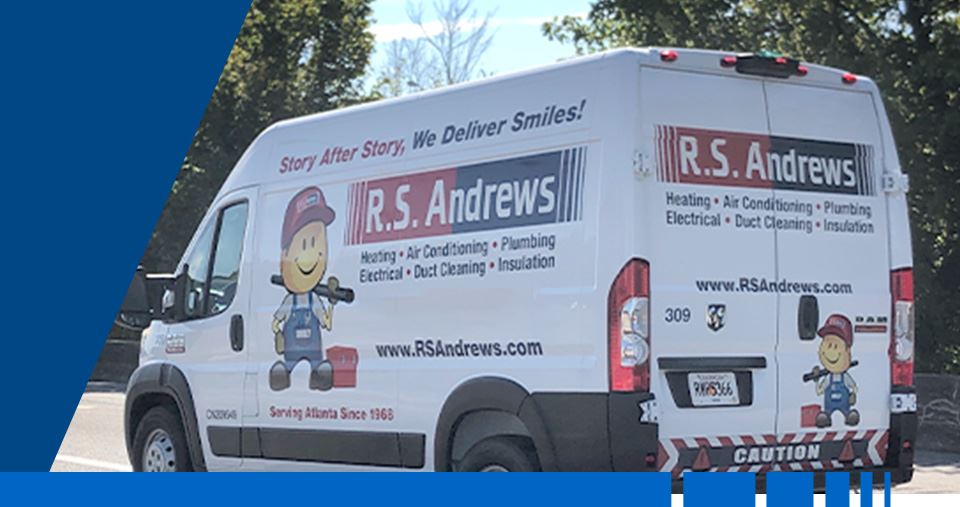
Ask an Expert
Want advice from a real plumber, electrician, or HVAC professional?
At R.S. Andrews, your comfort and safety are our top priority. Whenever we can help you solve your problem, we want to—we’ve learned that it pays to satisfy our customers’ needs quickly and efficiently.
To help you with any electrical, plumbing, or HVAC problems you have, we have created a series of videos addressing questions that we get asked all the time. Our goal is to provide you with all the information you need to either troubleshoot your problem yourself, or understand how a certified technician can help.
If you don’t find the information you’re looking for, fill out the form below! You’ll hear back from a knowledgeable professional who understands the problem you’re having within 24 hours.
Frequently Asked Questions
-
How Do I Properly Size My A/C System?
Improperly sized air conditioners can cost you. Dan, the R.S. Andrews Answer Man, is ready to help you understand how to properly size your air conditioner. Air conditioners work by both dehumidifying the air and cooling it. The amount of cooling is known as “system load.” Many factors impact this, including the type of windows you have, the floor and wall insulation values, how many people live in your home, how many appliances you have, and even the height of your ceilings. This clearly is a complex process. Air conditioning technicians use the Manual-J Guidelines to choose the proper system size, in tonnage, for your home. Instead of oversized systems, which were common in the past, we now aim to perfectly size systems to avoid short-cycling and ensure proper balance and efficiency.
-
What Causes Air Conditioner Freeze-Ups?
Air conditioners can freeze for a number of reasons. Dirty filters, dirty coils, closed-off supply registers, and low refrigerant levels can all cause this. A frozen coil means the AC will blow warm air or run inefficiently, eventually damaging the compressor and leading to costly repairs. Faulty fans and thermostats can also cause these problems. If your filters and vents are working properly, you may need professional help. Check out this video to see what the problem could be.
-
What Are Important Steps for Furnace Care?
Curious about what you can do to keep your furnace running well? The experts at R.S. Andrews are ready to answer that question! Proper maintenance is a critical component of keeping your furnace running efficiently and effectively. Check out what happens in a maintenance check to ensure your home is safe and warm all winter. From checking the burner to testing combustion, our furnace care is comprehensive, giving you peace of mind that things are working well.
-
How Efficient is My Air Conditioner?
Air conditioning systems consume 8% of the electricity used in the United States. How efficient is your system? System efficiency is measured in SEER, or seasonal energy efficiency ratio. This measures the BTUs produced by the system when it consumes one watt of electricity. The higher the SEER, the more efficient the system. Today, 13 SEER is the minimum, but you can find systems up to 23 SEER. The higher the SEER, the less it will cost to cool your home. Other efficiencies include the energy efficiency rating (EER) and dehumidification abilities. Check out the video to see how energy efficiency ratings affect your energy costs.
-
How Can I Troubleshoot My AC Problems?
Is your air conditioner giving you problems? With the help of R.S. Andrews, you can get to the bottom of issues quickly. Sometimes, troubleshooting common A/C problems can help you save money. Some common troubleshooting steps include checking for power, checking the thermostat, cleaning or changing the filter, leaves blocking the outdoor unit, and blocked registers – and these are all things you can check on your own. Low refrigerant levels, water in the drip pan, and problems with the blower motor require professional attention. See more tips on how to troubleshoot common A/C problems in this Ask the Expert video.
-
How to Replace Your AC
Is it time to replace your air conditioner? This video from Dan the R.S. Andrews Answer Man, will help you decide if yours is ready to be replaced. While age is a factor, it’s not the only deciding factor. If you need frequent, costly repairs, have an expired warranty, or have high energy bills, you may want to consider replacement. You can save 20%-40% with a new, more efficient system. Hot or cold rooms or humidity problems are another sign that you may need a new system. Return on investment is important to consider as well, and this depends on how long you plan to be in your home. If you’re considering replacement, try to schedule it before your system breaks down so you can plan ahead, choose the right system, and save for the purchase. Check out more expert tips in this video.
-
Tips for Buying a New Air Conditioner
Your air conditioner can last for 12 to 14 years, but replacing an older unit can actually help you save on utility bills. What do you need to know before you upgrade? First, make sure the system is sized properly. Our team will help ensure you choose the right system. Second, the location of your system is important. Put it in a cool, shaded place outside of the direct sun, and make sure it has unimpeded airflow. Finally, watch out for the lowest bid, which could compromise quality and efficiency.
-
System Balancing
If you have uneven cooling or heating, it may be because you need system balancing. Balancing refers to managing the volume of airflow through your duct system. This helps maintain comfort in your home. We have specialized tools to help balance your system and ensure even heating and cooling throughout your home. Measuring airflow allows us to see the airflow in your home, so we can properly balance the ducts. We will check for leaks or other problems with your ductwork as well. Balancing also requires better use of the vents to ensure the right amount of airflow into each individual room. We are here to help you with system balancing!
-
AC System Survival Tips
Do you want to extend the life of your air conditioner? This video from R.S. Andrews will tell you how. Filter maintenance is one key to that, and you’ll want to change your filter regularly. Outdoor unit air circulation is another important factor. Give your unit proper clearance and keep it clear. Clear out indoor vents to ensure that air can circulate well. Close your blinds during the day to lessen the amount of work it has to do, and use the ceiling fan when you’re in the room. Open interior doors to balance your system. Use your thermostat smartly, and check your ductwork and insulation regularly to keep your AC running well. Finally, don’t forget to schedule that maintenance check at the start of the summer cooling season!
-
Air Filtration Selection & Maintenance
Choosing the right air filter and maintaining it properly can both improve your home’s comfort and extend your system’s life. Basic filters are the most inexpensive, but least efficient option. Pleated filters are also disposable but have a higher MERV rating. Electrostatic filters are the next level of filtration and can be disposable or permanent. HEPA filters block 99.97% of particles, but require specialized systems. Learn what to look for when choosing a filter, as well as how often to check and change your filter, in this Ask the Experts video.

See What Our Satisfied Customers Say
Over 6,800 Positive Reviews On Google!
-
“He said I also needed my filter changed, so he did that. It was so hot and he had to go under my home. He was so cheerful about it. My unit is back to cooling and my home feels wonderful.”- Shelley A.
-
“Petronio the Service Tech that came out to get my AC system cooling again was awesome. he was professional and had an excellent demeanor and I immediately felt very comfortable knowing he was going to shoot straight with me.”- Greg H.
-
“The T & T install team did a fine job as well, and they were really nice young men. We had 2 new high efficiency heat pumps installed: one of which is zoned.”- Danna S.


Here Are A Few Reasons To Smile:
-
Trusted Since 1968Decades of reliable service in your community.
-
Our Unmatched Customer Service
-
Our Money-Saving Tips & Special Offers
-
Our Industry Membership, Accolades, & Licenses